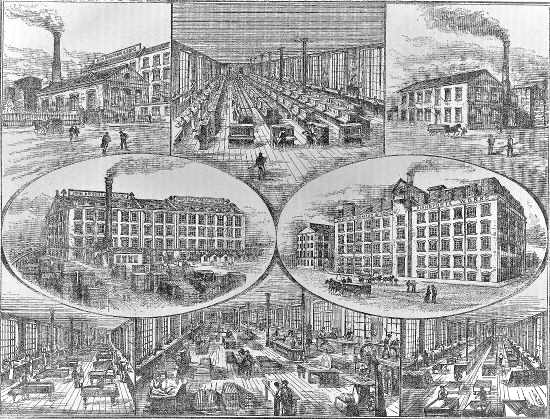home
| Pianoforte-makers
in England
BRINSMEAD
in London![]()

![]()
1893
The record of any of the leading business houses of Great Britain invariably discloses a story of remarkable success from small beginnings to a triumphal development, and in this respect the career of the eminent pianoforte-making firm of Messrs. John Brinsmead & Sons furnishes one of the most interesting examples of enterprise which the history of London trade and industry contains. The house originated in the reign of King William IV. in a shop in Charlotte Street , Fitzroy Square, long since abandoned. There Mr. Brinsmead first opened, with the assistance of two men and an apprentice, until subsequent expansion suggested the acquisition of a factory at Tottenham Court Road, which afterwards gave place to the great block of buildings at Kentish Town that now comprehend the industrial labours of the firm and their staff of 300 skilled men. Every year from the first has marked a series of enlargements, improvements, and innovations, that exemplify the tireless and energetic manner in which Messrs. Brinsmead have endeavoured to bring to perfection the all-important industry with which their name has a world-wide association. The Brinsmead Works at Kentish Town represent the culmination of the firm’s successive trials towards perfect organisation and equipment; and to anyone who is permitted to survey the interiors of the several buildings, the scrupulous methods which the firm employ, the satisfactory and minute sub-divisions of labour, and the extreme orderliness and expertness with which the merest details are forwarded, it will be manifest that Messrs. Brinsmead have spared nothing towards sustaining their well-won distinction in this branch of work, nor have omitted anything which modern ingenuity and their own experience could suggest to render complete a factory which, while conducted with the above staff, boasts an installation of sound plant, possessing sufficient power to maintain the firm’s remarkable yearly output of nearly 2,000 pianos per annum. Of the factory and its ample accessories, all of which present a forcible contrast with the unpretentious shop in which Messrs. Brinsmead’s great industry was initiated, the new factory is perhaps the most noteworthy feature, and it is here that the progress of the house is particularly manifested. The manager of the works is himself one of the Brinsmead family, while the senior partner of the firm has in no degree relaxed that enthusiastic interest in the advancement of piano production, which has been the basis of the firm’s almost unparalleled renown, and has made the name of Brinsmead — in every sense — a very household word. It would take a special opuscule on piano manufacture to enumerate even some of the various processes that this industry involves, and this being beyond the scope and purview of the present concise report on the firm’s position in relation to the work they exemplify, it may be more in accordance with the object of our present work to here direct particular attention to the firm’s saloons in Wigmore Street, wherein the highest and best phases of modern piano manufacture are illustrated under all the conditions characteristic of the principal west-end establishments. The Wigmore Street premises are indeed one of the “sights” of fashionable London, and have few rivals as regards their general attractiveness, while they are absolutely unsurpassed in respect alike of the great variety of pianos exhibited, and the magnificent quality and superb workmanship these embody.
The entire series of six showrooms are replete with instruments
exclusively of the firm’s own manufacture, and these number some 300 or 400,
ranging in price from the sound and popular drawing-room piano at forty
guineas to the most exquisite and elaborately finished model at the
plutocratic cost of three hundred and fifty guineas. The almost numberless
expressions of approval that have come unsolicited to the firm from the
English and Scottish press, from personages of rank and distinction, as well
as from the most accomplished virtuosi of the day, render unnecessary any
lengthy review in this short sketch of the unchallenged merits of Messrs.
Brinsmead’s pianos. Mr. Edgar Brinsmead is the author of a “History of the Piano,” which has become recognised as authoritative on the subject, while Mr. Thomas Brinsmead has had a life-long association with all the practical features of piano manufacture under the guidance of his father, the venerable and esteemed founder of the firm; and the prize medals and distinctions gained at home and abroad by the house have over and over again confirmed the truth of that famous utterance of the great Rubinstein — “the palm belongs to the grand pianos of the house of Brinsmead.” It need only be said in conclusion that to this honoured house belongs a very considerable share of the credit which the English-made piano of to-day so satisfactorily preserves. The highest authorities in the land — professional and otherwise — might be liberally quoted as corroborative of the fact that the productions of this firm rank foremost in general estimation; but the same object maybe attained if we refer merely to the Messrs. Brinsmead’s ever-increasing volume of home and export trade, and to the commercial laurels which more than half a century’s successful work, and the universal testimony of an appreciative public, have tended to confer." Ilustrated London and its representatives of Commerce, 1893 (messybeast.com)
BRINSMEAD
Click on the links above.
For references see page
|
|||||
